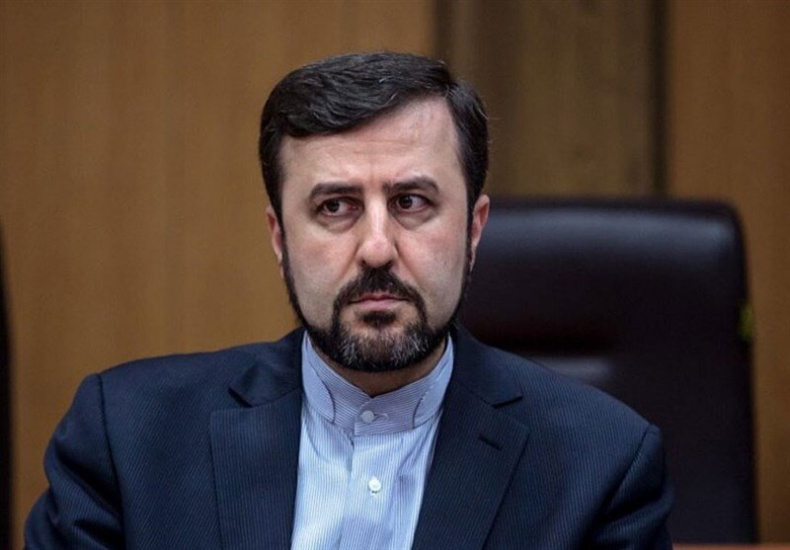Iran urges IAEA to be ‘independent, professional and impartial’

“Now, it is obvious that to whom the Late DG Amano was referring on 30 Jan 2019: If attempts are made to micro-manage or put pressure on the @iaeaorg in nuclear verification that is counter-productive and extremely harmful,” Gharibabadi said in a tweet on Saturday.
Gharibabadi was responding to JNS’s recent interview with Elliott Abrams, the U.S. Special Representative for Iran. The American official told JNS that the Trump administration has built leverage against Iran and that the next U.S. administration should use it. He said the U.S. administration needs to further cooperate internationally.
“There needs to be a lot of international coordination. Without the ‘maximum pressure’ campaign, I think you would not be seeing the kind of coordination in cooperation you are seeing between Israel, Bahrain and the United Arab Emirates. That’s very important.” Abrams said, adding, “We also need coordination with the Europeans, particularly the British, French and Germans, who were involved in the negotiation with Iran in 2015, to keep the pressure on the IAEA [International Atomic Energy Agency]. So, there are a number of places you need to keep the pressure on in the region, and you need to keep it on the IAEA about nuclear activities. And you need to keep the economic pressure on.”
These remarks elicited a direct response from Gharibabadi, who published a screenshot of Abram’s remarks, using the hashtag “reject pressures on the IAEA.”
The Iranian envoy said these pressures are detrimental to the international community.
“The Agency shall remain independent, professional and impartial. We should all reject these pressures which are detrimental to the interests of whole international community,” Gharibabadi tweeted.
Gharibabadi has recently denounced the remarks of IAEA Director General Rafael Mariano Grossi on Iran’s nuclear activities, underlining that presenting any evaluation is out of the IAEA mandate.
In his first interview since the assassination of Iranian nuclear scientist Mohsen Fakhrizadeh, Grossi told Sky News that Iran should not follow through on threats to increase uranium enrichment and throw out his inspectors.
"If implemented," he claimed, "these measures would be an even further deviation from the commitments that Iran entered into when it joined the agreement.”
He added, “I cannot imagine who would win from such a situation. If there was any limitation of the IAEA inspectors as a result of this or any other situation were curtailed in their work. Very clearly we would have to inform about this. We would have to be very clear to the world this is happening. And this in itself would not help anyone including Iran.”
Gharibabadi hit back at Grossi, saying the IAEA is not entitled to give any analysis or assessment on Iran’s nuclear activities.
According to the Iranian envoy, the UN nuclear watchdog’s mandate is only to verify Iran’s activities that it has been voluntarily doing as per the contents detailed in the Joint Comprehensive Plan of Action (JCPOA).
Iran-IAEA relations have been a little bit frictional over the past few weeks, especially after one of the IAEA’s confidential reports on Iran was leaked to Reuters, a move that angered Iran and prompted it to formally censure the UN nuclear watchdog.
Reuters has published details of a confidential IAEA report claiming that Iran plans to install three more cascades, or clusters, of advanced IR-2m centrifuges in the underground plant at Natanz.
“In a letter dated 2 December 2020, Iran informed the Agency that the operator of the Fuel Enrichment Plant (FEP) at Natanz ‘intends to start installation of three cascades of IR-2m centrifuge machines’ at FEP,” the IAEA report to its member states said.
The leakage of the report has drawn strong criticism from Iran. Kazem Gharibabadi has said Tehran will soon legally pursue the leakage of the report by the IAEA and called on the agency change its confidentiality mechanisms, which it uses for internal communications.
“Iran’s objections and legal proceedings against the Agency in the field of protecting confidential information have a history of more than two decades,” Kazem Gharibabadi said in an interview with IRINN on Saturday. He further explained that for a long time “the Agency’s safeguard reports, which were also very detailed, were prepared and distributed among the members, and in the last five years, the reports on Barjam (the Persian name for the nuclear deal) have been replaced.”
Gharibabadi pointed out that the confidential report was leaked to the press even before members of the IAEA Board of Governors could track it down.
“@iaeaorg confidential report, based on Iran's confidential letter, appeared in Media immediately even before the BoG Members could track it down. Agency is not merely responsible to update the development, but shall ensure confidentiality of safeguards information. If neither the Agency nor its Member States are to be blamed for this crack in confidentiality, @iaeaorg should revise its confidentiality mechanisms including regarding using GovAtom as the safe and confidential means for communications,” the Iranian diplomat said in a tweet on December 4.
Source: Tehran Times

